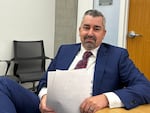Multnomah County’s new district attorney Nathan Vasquez officially takes over Monday, after being sworn in at the county courthouse last week.
In the time since he was elected last May, Vasquez said he’s attended every “roll call” in Multnomah County, meeting with police officers at the beginning of their shifts “trying to build relationships and repair relationships with local law enforcement, because that’s been a big issue.”
Among his top issues is expanding capacity inside Multnomah County’s jails to house more people and offer substance use treatment, a plan he estimates will cost $40 million to $50 million at a time when the county is preparing for budget cuts.
“When I look at this plan, it’s a big, big ask,” Vasquez said. “I believe it’s time that we look at public safety as a priority.”
He also had sharp words for Oregon’s public defense crisis that has now stretched on for years, taking particular aim at many of the defense attorneys who take court-appointed cases in Multnomah County:
“I don’t say crisis,” Vasquez said. “I call it the work stoppage.”
In a wide-ranging interview with OPB’s Conrad Wilson in late December, Vasquez laid out his plans for the district attorney’s office, everything from tackling gun violence and homicides, to law enforcement’s role in combating drug addiction, and how he wants voters to hold him accountable.
This interview has been edited for clarity and length and to add context.

In a December interview, Multnomah County District Attorney Nathan Vasquez said his office will prioritize victims and public safety.
Conrad Wilson / OPB
Day-one priorities and public defenders
Conrad Wilson: There’s this period of time where there’s going to be a lot of attention on changes you make, policies that you enact, or don’t, and what you prioritize. What are you going to do that is different? What are the two, three things that you’re going to prioritize very early on?
Nathan Vasquez: First is victims, and making sure that there’s a focus on public safety from my office. Number two will be addressing the substance use and abuse crisis that’s out there and taking all efforts we can at the District Attorney’s office to be involved in that. And the third big one is gun violence. We have seen, in this community, far too much gun violence, too many homicides. There’s been some recent improvements, which is good, but we are still somewhere between 65 and 70 homicides for 2024, and that’s not at all a drop from the year prior. I’m someone that will always say one homicide is too many, but certainly 65 to 70 is just completely unacceptable.
Wilson: Can you talk a little bit about the nature of those homicides? There’s killings where people are in the wrong place at the wrong time and there’s also targeted violence. Is this a gang issue? Are guns too accessible?
Vasquez: I believe there is a gang issue, I don’t think it’s the only issue though. We’ve seen a dramatic increase in our houseless population in the homicides among them. We’ve seen a significant amount of homicides involving some form of substances. There’s not one thing you’re going to do that’s going to make this better. It is going to take a very determined effort at a lot of different levels.
That means we can’t have a revolving door where people are just kind of getting arrested, getting out, having warrants out, coming back, getting out again, over and over. Not getting defense attorneys because of the defense attorney work stoppage. There are lots of areas where we need that functioning system because when we’re doing the work, when we’re holding people accountable, oftentimes that can prevent things from getting out of control and getting to a place where we see these homicides occur.
Wilson: When you say “defense attorney work stoppage,” what do you mean?
Vasquez: I hear it referred to as a defense attorney crisis. I don’t accept that. I don’t agree with that terminology. I see it much differently. And so it is a situation where I see that we have lots of money and resources dedicated to our public defense system, but we’re not getting the cases handled the way that they should be, particularly in Multnomah County. It’s different in different counties. Some counties, the smaller ones, maybe down in southern Oregon or on the coast, they certainly suffer from an issue of not having an actual enough number of attorneys. That is not the case here in Multnomah County.
(Editor’s note: Oregon has a documented shortage of defense attorneys, leaving thousands of people unable to access their constitutional right to a lawyer. Without representation, it is virtually impossible to close cases. Legislation passed in 2023 sought to boost public defense by adding funds and implementing structural changes to prevent a shortage of attorneys from happening in the future. But the crisis has not ebbed as quickly as many hoped.)
Wilson: Do you think that, historically, court-appointed defense attorneys, public defenders, have had too many cases and not enough pay?
Vasquez: Do I think that historically there have been times where they’ve had too many cases? Sure.
Wilson: So do you think that the public defense crisis is a false narrative entirely?
Vasquez: It’s hard to say whether it’s a false narrative.
I think the current narrative of that there’s not enough attorneys or that they’re overworked, I don’t think that’s correct at all. And I have been pushing hard for transparency and accountability. And I’ll tell you, I see many, many defense attorneys who work extremely hard, but that’s not all of the public defenders. In fact, that’s only a section of them here in Multnomah County.
So what we have here is literally close to a thousand cases right now with unrepresented defendants that are out of custody, their cases are essentially going nowhere. We, from the District Attorney’s office, want to see them move forward. We want to prosecute them, but we cannot do that until they get a defense attorney. I want individuals to have proper representation. I want victims' cases to get prosecuted. We need a functioning system.
Wilson: You mentioned the public defense crisis is really delaying justice or making it difficult to move through cases that shouldn’t maybe be difficult to move through.
Vasquez: Yeah, I don’t say crisis.
Wilson: What should we call it?
Vasquez: I call it the work stoppage.
Wilson: You could see why public defenders may see that as picking a fight?
Vasquez: They should pick up more cases and I’ll stop calling it that. My only concern is how do we get a functioning system? I’m happy to support them if they’re taking the cases. This is a situation where my deputies, we’re taking all the cases, we’re doing all the work, we’re not refusing to issue things, we’re not refusing to do this work. I just want them to join us.
Is a work stoppage the best term? Perhaps not. But I think it’s one that we need to take a real critical look at.

A view of the Multnomah County Courthouse
Courtney Sherwood / OPB
Expanding jail capacity
(Editor’s note: In October, Multnomah County Sheriff Nicole Morrisey O’Donnell told the county’s public safety leaders that the jail was above 90% capacity, nearing levels that would require the release of people held on low-level charges. The county board approved nearly $1 million to help ease staffing issues at the jail.)
Wilson: The jail has reported they’re basically full. And by full, I mean safely able to …
Vasquez: Let’s talk about that. So the jails are not full. In Multnomah County, we have a capacity of approximately 1,600. They are staffed to house about 1,100 individuals. So there are 500 empty beds.
In the short term, you’re going to see people being released out of jail because it’s “too full now.” But that “too full” issue is just that the jail has not been properly staffed for the need. Now, the sheriff has been asking for that recently. The county chair has come along to help with that issue.
What happened was the priorities of the county shifted away from funding public safety at certain levels. We saw that the ability of the sheriff to staff and be able to open up these jail beds decreased. And so we saw the number of jail beds decrease.
Wilson: You would like to increase jail capacity. I just want to make sure I’m getting this right.
Vasquez: Yeah, it’s not capacity. And let me be clear. My strategic vision and plan is actually to take the existing capacity and transform it into something that I believe will work much better for this community and for the individuals. A small amount of those beds are being used for treatment readiness dorms. We should be increasing that.
Why would we not look at this as an opportunity to intervene to get them into a stable place? We can do that through the treatment readiness dorms. It’s not the end-all answer, but it is an opportunity to give them a short-term amount of stability. And my overall strategic vision is one of looking at the whole continuum, not just prosecution issues.
To get people in the best situation possible so that when they are coming out of these very short-term times in our local jail, they are in a place of stability and ready to engage in some of that longer-term sobriety and treatment.
It’s a substantial investment in public safety and in our community, and it will be a huge ask of our county commissioners, but it’s one that I believe is necessary to get our community moving in the right direction. It’s the right blend of compassion and accountability that we need.

Multnomah County Justice Center, in Portland, Ore., July, 2023.
Caden Perry / OPB
Wilson: You said “treatment readiness dorms,” I don’t really know what that means.
Vasquez: I mean, treatment readiness is just that you have individuals in there that need to get sober. Some of these individuals have been really strung out for days, weeks on end, and you need to get them in a place where they are sober, they have a little bit of a clear head. Then maybe we can start talking about what’s the best pathway forward.
Wilson: So I just want to make sure I’m understanding this. When you did talk about treatment, you did use the word “increase” when you were talking about the treatment readiness beds.
Vasquez: It is truly opening up some additional dorms, but creating them with intentionality, creating them to be the idea that treatment readiness and getting people in the best, most stable place possible is important and vital to this community.
Wilson: But it is more people in the actual facility.
Vasquez: Yeah.
(Editor’s note: Vasquez went on to explain that changes in the court system that went into effect Jan. 1, 2025 are likely to result in judges ordering more people held in custody.)
Vasquez: But when we don’t have the staffing and the jail functioning the way it should, those individuals are going to go right back out on the street in a very unstable situation.
Wilson: Do you have a dollar figure for the treatment dorms? Any estimate?
Vasquez: The dollar amount, it looks to be somewhere in the $40 million to $50 million a year range. It’s a huge ask, but it is about creating a support network.
Wilson: If I recall, didn’t Multnomah County Board Chair Jessica Vega Pederson say something about county departments needing to prepare for budget cuts?
Vasquez: Absolutely. That’s been discussed this year. And when I look at this plan, it is a big, big ask. But Multnomah County has about a $4 billion budget annually. This is about 1%-2% of that. It is about looking hard at what our priorities are and making some decisions about that. I believe it’s time that we look at public safety as a priority.
I’m not looking like, “Hey, I want to see people locked up.” No, in fact, it’s the opposite. I want to see people get stable, get into a healthy situation, and then get them out of the criminal justice system. Right now, what’s happening is we’re having people cycle in and out, their crimes build, and then, oftentimes, we see individuals end up with much worse crimes and then they go to prison. We could do a much better job and really get involved earlier and head that off.
Wilson: And jail — with the treatment readiness dorms — is what you think is at least part of the solution?
Vasquez: For those individuals that are committing low-level crimes? Yes.

Portland Police officers and Oregon State Troopers arrive on the scene of suspected drug dealing activity in downtown Portland, Sept. 10, 2024. Since implementation of new criminal penalties for drug possession, more than 1,129 people have been arrested for drug possession and possession-related charges, according to state data.
Kristyna Wentz-Graff / OPB
Partnership with police
(Editor’s note: Since his election in May, Vasquez said he’s been working to build relationships with law enforcement, meeting with rank-and-file officers across the county.)
Vasquez: I wanted to go out and speak to every law enforcement officer and tell all of them we’re going in a new direction and it’s going to be built around partnership. One of the first initiatives that I’m going to do is have all of my deputy district attorneys, particularly the young ones, go out to those officers and they’re going to have coffee, they’re going to go to roll calls, they’re going to do ride-alongs, because I want to build a partnership that this community is proud of.
Wilson: I think a lot of people would say that’s great. And then the flip side: do you feel like there is still the ability to hold officers accountable?
Vasquez: Yes, I do. I have an expectation that they will be not just following the law, but also avoiding the appearance of impropriety. When I talk to officers — and I’ve spoken to well over a thousand — they want that as well. They want to make sure that there is integrity and honor in what they’re doing. And if I’m not doing my job and holding accountable officers who have broken the law, it is a poor reflection on all of them.
What I see is that they want, desperately, for this community to trust them. They want to earn that trust, and that comes by having a healthy public safety system. It means holding people accountable inside the public safety system when they do something wrong, and doing everything we can to avoid that as well.
Wilson: One year from now, how do you want folks to judge your performance? How do you want voters to assess whether or not you’re doing a good job as they think about public safety? What are the metrics?
Vasquez: Well, I think they’re both tangible metrics and then there’s the intangible.
The intangible ones are pretty straightforward in my mind: Do you feel safe in your community? Do you feel like the system actually works? When I call the police, do they show up to make an arrest? Does the prosecutor prosecute the case? Does the court system get their case through the system, and are they held accountable?
The real tangible metrics: I want to see the murder rate come down. I do, I desperately do. I want to see us get back to some of those levels where we only had 30 homicides or less a year. We have not seen that for several years and I want to see us get back there. That’s a very tangible number.
